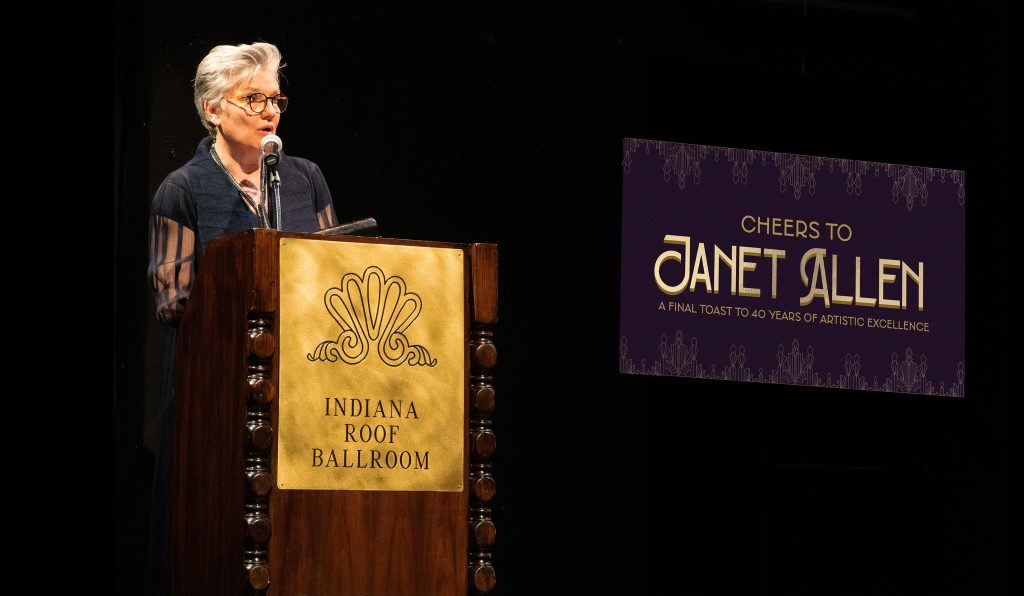
Janet Allen – Courtesy of Indiana Repertory Theatre. Used with permission.
There were scores of well-wishers, including the crème de la crème of Indy’s arts, culture, and philanthropic scenes at the Indiana Repertory Theatre on June 6 to celebrate the career of Janet Allen, who was appointed its artistic director in 1996. It was a glittering send-off for an arts leader who was recognized for her contributions to Indiana’s professional regional theatre. At the event, she was honored in front of friends, family, and partners with the mayor’s proclamation of Janet Allen Day and the governor naming her a Sagamore of the Wabash. Allen’s last day at IRT is June 30.

Janet Allen – Courtesy of Indiana Repertory Theatre. Used with permission.
According to a recent post on the IRT’s Facebook page, here are just a few of her accomplishments: “Janet has worked with four managing directors (including Brian Payne, CICF President and CEO who is also retiring), 14 board chairs, and just a few dozen committees. Each year, she supervised a company of about 100 artisans and administrators. She has produced 238 productions of 193 different plays. She’s worked with 68 directors, 51 set designers, 104 costume designers, 80 lighting designers, and 99 sound designers. 500 actors have played over 1350 roles for 2.5 million theatregoers. And on top of that, Janet has presided over two capital campaigns that have raised a total of 36.5 million dollars.”
As far as Allen’s contributions to IRT, no one is more aware of them than Suzanne Sweeney, the theatre’s managing director, who has worked alongside her for 25 years — 15 as the Director of Finance and Associate Managing Director and 10 as Managing Director.
Reaching out to Sweeney by email, first I asked her what was it like working with Allen, to which she replied, “Janet makes me want to do better and inspires us to support her vision. She is a big part of why I wanted to stay at the IRT for so long. She certainly challenges her colleagues, yet at the same time has incredible respect for what everyone brings to the table. She also believes in the importance of home life and family and has encouraged that for others. I am so happy for Janet as she moves into the next phase of life, but I will dearly miss working with her every day.”
When asked what Allen leaves behind, Sweeney noted, “The IRT has come far in the years she has been AD. We have grown to a more fully realized professional theatre at every level, both administratively and artistically. She has built up the student matinee program that welcomed 40,000 students annually, pre-Covid. She helped develop a cadre of local artists who could afford to stay in Indy thanks to the work offered at the IRT, and she developed the Indiana series and was an early adopter of place-specific work. She believes in the stories of the Midwest and Indiana, and she made sure they were told. This culminated in “Finding Home: Indiana at 200,” about Indiana’s bicentennial, and I only wish that Covid had not taken away the Indianapolis version that had been underway.”
And what about Janet Allen’s successor Benjamin Hanna, who is taking up her mantel soon as IRT’s newest artistic director? I also reached out to Hanna by email and asked him what he learned from his mentor.
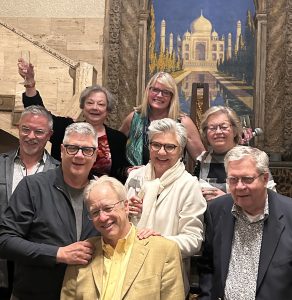
Bottom – Brian Payne. Second row – Steven Stolen, Janet Allen & Richard Ferguson. Third row – Rob MacPherson, Priscilla Ferguson-Wagstaffe, Suzanne Sweeney & Jane Robison. Courtesy of Indiana Repertory Theatre. Used with permission.
“Janet has been an incredible mentor over my time as associate artistic director. Janet has taught me the power of trusting your instinct, the importance of developing community one new patron at a time, and the value of making art for your neighbors and the whole community. She is a firm believer in sustainability and future-forward thinking and has left IRT well-positioned for another 50 years of excellent art-making, education, and community partnership,” he stated.
I also asked Hanna how he planned to follow in Allen’s footsteps, to which he replied, “I will, as Janet did, lead with heart and from my own point of view. I will build a season of excellent work from a variety of perspectives and voices that aim to illuminate the human condition and challenge us to grow empathy and care for each other. I will support building new plays and opening our doors wider, working to eliminate barriers to attendance and participation and growing those who see IRT as their home theatre.”
Regarding my own history with Allen, I first met her in 1980 when she arrived after receiving her MFA from IU-Bloomington to work as IRT’s dramaturg and literary manager. At the time I worked at WRTV, Channel 6, as a producer-director. In 1987, she and I co-produced a documentary celebrating IRT’s fifteen-year anniversary, collaborated on an innovative video element that was included in a 1986 production of “The Skin of Our Teeth.” and on a poetry video project sponsored by the Arts Council of Indianapolis. Later, when I began reviewing for publications such as “Arts Indiana” and “NUVO,” we regularly encountered each other and continued to do so up to when I began writing and publishing this column on my website TomAlvarez.studio. Along the way, we became friends and were even neighbors for a while in Chatham Arch downtown.
Prior to Allen’s retirement bash, I had the opportunity to sit down with her at one of her favorite Mass Ave spots, Coat Check Coffee House at the Athenaeum, to chat about her legacy and retirement. Below is an edited transcript of our conversation.
What will you miss the most?
The people I interact with every day. Artists. Audience members. Donors. The people I interact with every day. The whole gambit. Arts professionals in town. But a lot of that will be choice. I will have to make efforts with some of those people when I have seen them daily for 40 years. I am going to miss standing in the back of the theatre and watching audiences react to the work. That is one of my favorite things to do. Often after the curtain speech, I will go up to my office and just listen to the show on my monitor and just listen to the language.
Do you anticipate grieving once you leave IRT?
Yes, but I must say, I did a lot of grieving over COVID. I grieved everything about our craft and not being with live audiences for a year and a half. I have done quite a lot of grieving already. I have known for quite a while about my retirement date. Eight years ago, I informed board leaders because I was calculating my children’s ages, my husband’s age, and my age. I am sure I will grieve some more, but I feel like I did a lot of that in the past three years, especially the last year because I have been very intentional about departing.
In everything there is the necessity of generational change. We need to get out of the way and let younger people lead these organizations. I believe in that fervently. I was the beneficiary of that when Libby Appel left. She was going to lead another theatre, but that was an opportunity for generational change at the IRT, too, so I always knew that the day would come. Do you know when that right moment is? I don’t think so. When I think back, I say to myself, “Wow, had I known about COVID, would I have done something differently?” There is no answer to that. One of the ways I have always judged my fitness for this job is that the IRT building is surrounded by stairwells. I used to be able to leap up those staircases without thinking about it, but now I can’t. I always said when I can’t bound up those stairs, it’s time to go. That day is now. (laughs) This is a young person’s business, running a theatre. It requires incredible stamina, and as you know, it’s incredibly hard work. You must be willing to work at night and weekends and everything in between. That takes a toll on our bodies. I think how we want to contribute with our brains, and we get to the place where we don’t have the stamina. For me, I am going to exercise my brain for a while, at least, differently.
Looking back, what are some of your fondest memories?
There are so many. I truly struggle to identify them. I take great joy just in the daily moments when you are listening to a post-show discussion where an audience member has a big light-up moment. Times when we are doing a play that is deeply enmeshed in social justice and someone in the audience says, “I never knew that actually happened!” And they come away with a new dimension gained through dramatic storytelling, rather than a history book or a newspaper. Those moments matter to me, and there have been many, many — like the post-show discussions of “The Diary of Anne Frank” when some said, including grownups, “I never thought that really happened.” Some of those light-up moments are for us, too. We tend to think, as enlightened people, that ignorance doesn’t exist in the world anymore, but it does exist. We recognize that we are not always moving forward in history, culture, and awareness.
Those moments matter. The moment when you ask someone for a lot of money, and they give it to you because they believe in the organization. They are very memorable to me. Another piece — and this is another category and one that means a lot — is seeing an actor making a breakthrough, where they have been pushing against some moment in a play that they just can’t move forward through, and they find a way to unlock that moment and go deeper into a text. Those moments are not about particular events. They are not about individual plays. I also have tremendous pride in the people I have mentored doing magnificent things. Courtney Sale (former IRT associate artistic director) is in her second artistic directorship now.
Tell me about your relationship with the late Tom Haas (former IRT artistic director). How did he influence you?
Hugely. Hugely. I still grieve over losing him. He taught me tremendous, explosive lessons about text. He was such a brilliant unpacker of text. Some of the productions he did years ago just sit in my memory. One of them, “Six Characters in Search of an Author” — it was such a luminous production that you could have seen it in New York or London. He was a great visionary, but not very practical, and so I learned to be practical for him, and that was tremendous preparation for my job. Because you have to be a visionary or hire a visionary, and you have to be practical to run one of these organizations. I started as a dramaturg, and then I moved to New York, and Tom convinced me to come back as an associate artistic director. One of the great mentoring experiences that he taught me is that he let me go and move to New York, but he said, “But don’t sever your ties with us.” I was there for three years and came back for many reasons, both personal and professional. I was 29. I had these demands I wanted met before I would return, and he said, “Great. What are these demands?” And he met them all. I said, “Wait a minute. I thought I was going to get resistance to all this stuff.” (laughs)

L-R Libby Appel & Janet Allen – Courtesy of Indiana Repertory Theatre. Used with permission.
How about Libby Appel (former IRT artistic director)?
Libby taught me so much as well. She taught me how women lead differently than men, and she made me believe that is possible. She taught me more about how you combine art and practicality. She was really in opposition to Tom. He chafed about putting those things together. She understood that. She had never been an artistic director but had been a dean at Cal Arts, and so she knew about that juggle.
What is your most important accomplishment?
Accomplishment is a balancing act between: how do we preserve quality and how do we achieve sustainability? Right now, we are watching a lot of venerated theatres like the IRT becoming hugely endangered, with fragile financial footing. But IRT is not there because we have dedicated ourselves for quite a while to achieving sustainability. The IRT almost went down in the mid-80s when its debt load was larger than its annual budget. And because of people like Bill Hudnut and a lot of founding fathers of this city and this culture, we saved the IRT. The endowment is a piece of sustainability, but how we operate is, too. We do not operate in deficit budgets. We don’t because we know if we do, it is a very slippery slope down, so we are very frugal fiscal managers because we want the theatre to be here in 40 years.
What have you learned while at the IRT?
80% of the job is about HR. Managing people. A lot of listening and a lot of “This is what we can accept and what we cannot” — about behavior and being very clear about those boundaries, such as those in all good relationships because the artistic side churns every seven weeks, and you get a new set of directors and designers, HR, and actors in. You must have sturdy boundaries: “This is our culture; this is what we respect and what we don’t respect, and that is how we are going to proceed.” Actors and designers work all over the country all the time, and there are different cultures everywhere. No theatre functions the same way, and our culture is based on our values. I think HR is the biggest part of the job.
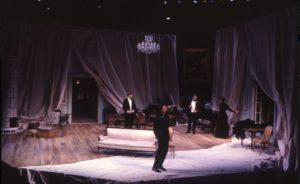
“Hedda Gabler” 1991 directed by Janet Allen. Courtesy of Indiana Repertory Theatre. Used with permission.
Do you think artists are temperamental?
I don’t. I don’t think they are treated well in this country. Consequently, they must build a lot of armor. I think that is part of the defense mechanism. It’s a terrible business in which to make a living in this country. COVID taught us how fragile it is. People have been insured by their unions for 30 years, but then have no health insurance because of catastrophic things? This country does not treat artists with very much grace. I consider how to help people work through that fragility to make great work when they are in Indianapolis, but we must create good conditions to make them feel supported, and that can be hard.
What are your regrets?
There are so many plays that I couldn’t do that I wanted to, and I won’t name them because it is not worth it. But there were giant things that we couldn’t do which were too expensive or not audience enticing enough. I regret that we didn’t extend rehearsal time when we weren’t ready for something but that is not possible in a subscription season. There is no flex in the schedule, so things like that. Times when I felt like I didn’t support an artist or a production well enough. Times when we thought we were all set to get a big gift from an individual or foundation, and it didn’t happen. Those are the regrets.
Were there failures?
Many. Productions that just didn’t work. Productions that didn’t land. Productions that didn’t meet the quality. And it could be that it was a lousy play selection, of which I made several, and I watched my predecessors make. When we didn’t stuff it right — the wrong director, the wrong casting, the wrong design viewpoint. All those things. Failure is daily when you are making art, multiple times a day.
Did those failures teach you something?
Always. I’ll give you a lens on that. Every year we do this in June. Along with Suzanne Sweeney, we gather the artistic staff, and we do a season-long artistic assessment. We go through each play, and we talk about what we did and didn’t do well. What did we learn from the failures? I’d take copious notes that I almost never look at again, but the act of taking notes pushes it into my body somehow. I think that constant sort of assessment of every production with its director, design team, creative team is important. How did we do in supporting you? How could we have done better to support you? So we do a lot of assessment. It is not data driven. It’s feelings. Nobody is right or wrong. I loved that costume. I hated that costume. We all disagree because we all have different visions of what quality means. Sometimes our artistic staff will say, “I just love working with that actor,” and I will say, “I thought that actor did lousy work on stage.” That interaction makes better art.
What impact has IRT made?
One of the things that means a lot to me is when a patron or donor who sees work at a lot of other places — Chicago, New York, or Europe will say. “I saw this play, this production in x location, and yours was every bit as good or better.” I do love that. Something right now is also making me joyous. “Clue” is selling so well. Our jargon is “It’s a license to print money.” It was over our single-ticket goal. It is such a great example of how greedy people are for fun right now, and that is what is drawing them into the theatre. They just want to come have fun, and they don’t want to get depressed. That’s joyous to me because I learn something from that.
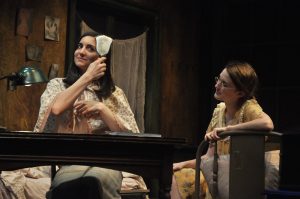
“The Diary of Anne Frank” 2019 directed by Janet Allen. Courtesy of Indiana Repertory Theatre. Used with permission.
How will you spend your time in retirement?
We are going to spend more time with our family. We have a granddaughter we have never seen, who was born to my stepson and his partner. They haven’t been able to get out until now. They are coming this summer. They have a two-year-old we have never met. Spending more time with our family and friends is a big thing. I look forward to reading a lot of books. I am an introvert, so I want to read. I want to volunteer. I am very interested in literacy programs at Indy Reads. I am interested in outdoor stuff, but I don’t know how I am going to do that part yet. One of the things I am ready for is more time outdoors. I have been in a dark room for 30 years, and this time of year I am just hysterical to be outside. I garden and I cook, although Joel is the primary cook, so I am more of the sous-chef.
Will you see any shows?
I don’t know. I think I may need a rest for a while.
What is the state of theatre in Indy?
I think it is burgeoning, and that makes me happy. Generally, in mid-size markets, there’s been, historically, from the late 60s to late 70s, large theatres that grew up like trees and little theatres grow up like seedlings and many of them succeeded. One of my conversations with Bryan Fonseca was exactly what is happening now with the growth of Summit Performance, American Lives Theatre, and others. How do we encourage the growth of more small theatres? I hope he is happy. (laughs)
What about the national state of theatre?
I think it is very endangered. I can’t think with much authority about what it is doing in the community theatre sector, but if this town is any example, community theatre is doing well. Big professional theatres are struggling, particularly if they were not financially sustainable before COVID, so we are going to see a lot of faltering and closing in big professional theatres because they won’t have time to retool. In our collective bargaining unit, the League of Resident Theatres, we are seeing people say we are cutting 40% of our staff. It’s hard. I don’t know how commercial theatre is doing. I don’t study analytics. My very anecdotal look is that it’s doing ok if you are producing something really popular.
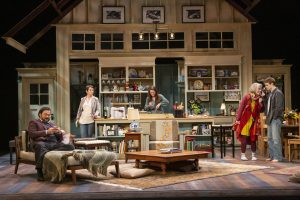
“The House That Jack Built” Directed by Janet Allen 2021 – Courtesy of Indiana Repertory Theatre. Used with permission.
What do you say to those young people who are considering a career in theatre?
Cross-train. If you say, I only want to be an actor, or if you are only going to be an educator, I am constantly saying to kids coming out of MFA programs, don’t disdain other parts of the field. I was training in college to be a professor. What I did for work in grad school was to work in marketing in the theatre department, which meant I wrote a lot which helped enormously. I am not a marketer, but the cross-training helped me to be one. Looking at other parts of the theatre, not just the one you are most passionate about, and looking at it more holistically, is important.
Are you proud that IRT has always been ahead of the curve in terms of representation?
It should have happened decades ago. I watched two things happen — I’m sure, in part, because of my gender. I have watched women move into a more powerful position in the theatre and people of color into many more power positions. And that together “has really changed the field in the best way. I always think we could have done more, and we now will do more and are doing more to make more equity and to make more opportunity for people who historically have been boxed out.
Any thoughts about our mutual friend Bryan Fonseca?
I loved Bryan. We had our differences, but we also had so much common ground. One of our last big conversations was at the Cultural Centre groundbreaking when I said, “Are you thinking of retiring? I am.” And he said, “Nope, I want to die at a tech table,” and in some ways he did. He was just so defined by his art. I was always worried about him, that he was working too hard and was endangering his health, which would lead to bad consequences.
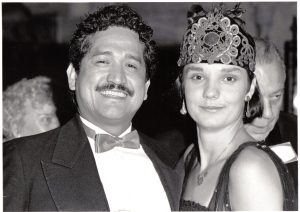
L-R Tom Alvarez & Janet Allen 1987 – Courtesy of Indiana Repertory Theatre. Used with permission.
How has Indy changed during your tenure?
Tremendously. You are an indication of how much more diverse it is. While it is still segregated, I think there are a lot of neighborhoods and events and places where the diversity is just so wonderful. There are lots of neighborhoods now. There aren’t just two or three historic neighborhoods downtown now — there are 20, and as people identify their neighborhoods as something they want to lift, that is just all the better for the city. I am very Pollyannaish about it. I believe it can just get better and better, and part of it is that great map of neighborhoods identifying themselves and saying, we have an identity and it’s gorgeous. I think that the more diversity and art we have and better food options we have, the more heartened I am about Indianapolis.
What is your parting message to Indy?
Art enriches our lives. It expands our lives. It connects us with those we think we are very different from. It teaches us. It elevates our humanity. This is a place where the arts are still kind of a frontier. There are still people who don’t understand or accept that message. This is not just a sports town. It’s a culture town as well. The gathering of sports is great. The gathering to share stories, I think, is great, and I think that is all moving forward. The message is that art changes lives and shared storytelling matters. And sitting in a place with other people matters. We learned that during COVID. It is not just sitting anywhere, but the opportunity to share experiences sitting in a theatre or sitting in an outdoor amphitheater. Those things matter.





